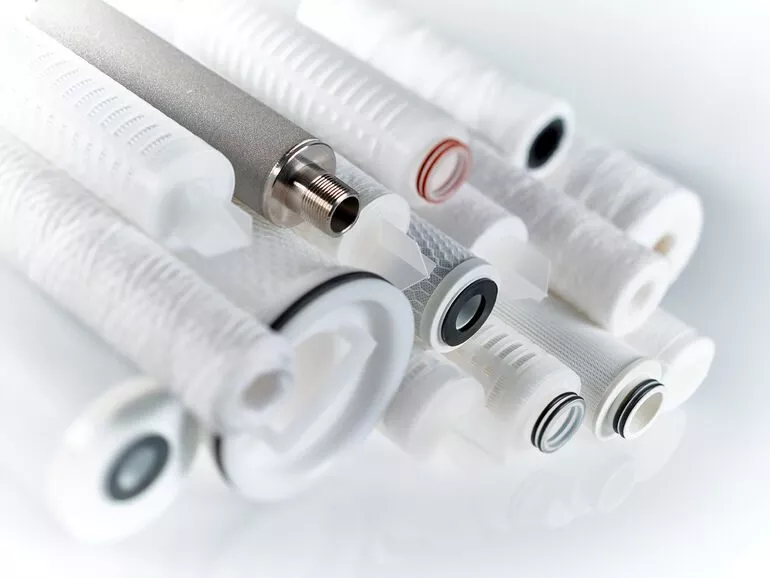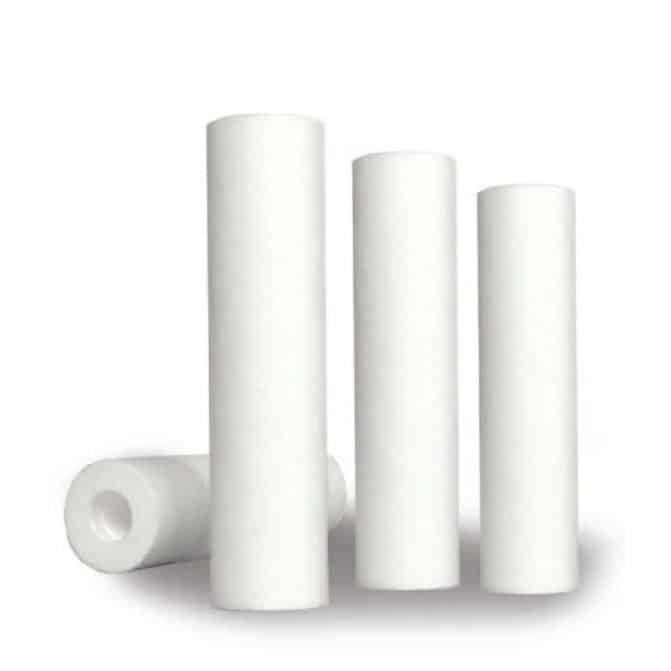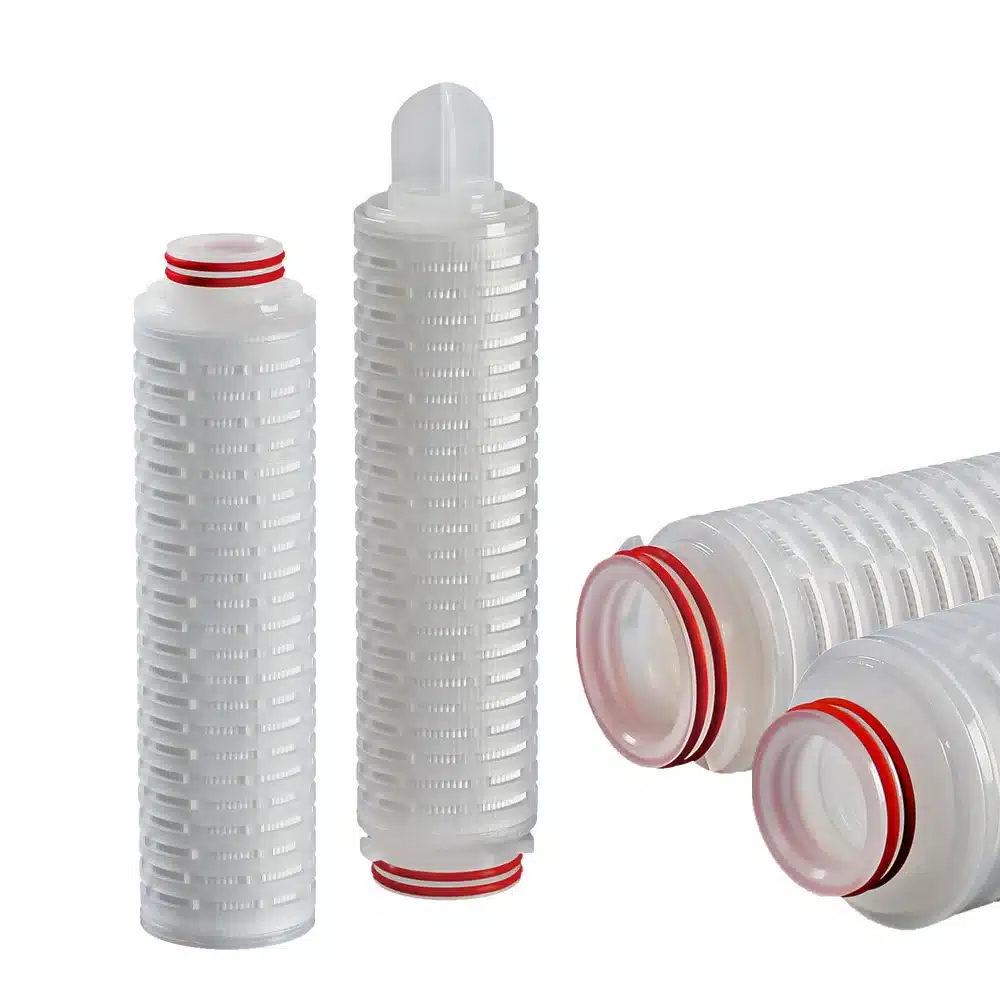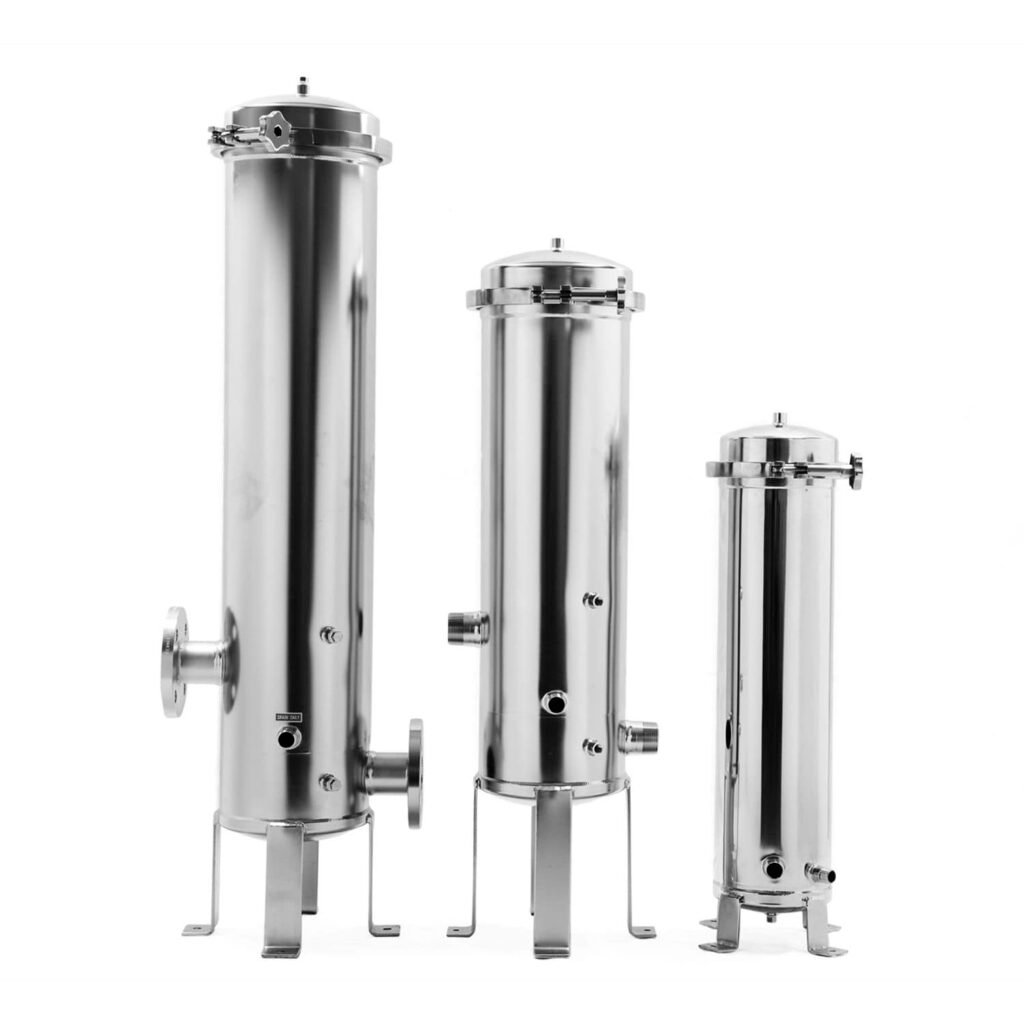Application of Pleated Filter Cartridge for Different Industries
INTRODUCTION
Filtration plays a vital role in nearly every industrial process, from purifying drinking water to manufacturing biopharmaceutical products and producing clean chemicals. Among the various types of filter elements, the pleated filter cartridge stands out as one of the most widely used and versatile filtration solutions.
A pleated filter cartridge uses finely structured filter media folded into pleats to increase surface area, allowing for higher dirt-holding capacity, longer service life, and stable filtration performance. These cartridges are available in a range of materials such as polypropylene (PP), polyethersulfone (PES), nylon (PA), polyvinylidene fluoride (PVDF), and polytetrafluoroethylene (PTFE), each suitable for specific industrial conditions.
In this article, we will explore the diverse applications of pleated filter cartridges across key industries, including:
Water and wastewater treatment
Food and beverage processing
Pharmaceutical and biotechnology production
Microelectronics manufacturing
Chemical and petrochemical industries
Power generation
By understanding how pleated filters function in these environments, companies can make informed decisions when selecting the appropriate filtration system to achieve consistent quality, regulatory compliance, and cost efficiency.
1. Pleated Filter Cartridges in Water and Wastewater Treatment
1.1 Importance of Filtration in Water Treatment
Water treatment is one of the most common and critical applications for pleated filter cartridges. Whether in municipal systems or industrial water purification processes, maintaining the purity of water is essential to ensure safety, prevent equipment damage, and meet regulatory standards.
Pleated filter cartridges are used in various stages of water treatment, including pre-filtration, final filtration, and post-treatment polishing.

1.2 Pre-filtration
In pre-filtration, pleated cartridges remove suspended solids, sand, rust, and organic matter before the water reaches finer filters such as reverse osmosis (RO) membranes or ultrafiltration modules. This helps protect sensitive downstream components from clogging and extends their lifespan.
Common pleated filter types used:
PP pleated filter cartridges: ideal for general water filtration due to their high dirt-holding capacity and low cost.
Nylon pleated filters: used when higher chemical compatibility or temperature resistance is required.
1.3 Final Filtration and Polishing
In bottled water plants, semiconductor cooling systems, and pharmaceutical-grade water production, final filtration is crucial to ensure ultra-pure water.
PES and PTFE pleated filters are preferred for their superior retention of fine particles, microorganisms, and dissolved impurities.
1.4 Benefits in Water Treatment
Extended service life compared to depth filters
Consistent pore size distribution ensures stable filtration quality
Compatible with different water chemistries and disinfection methods
Easy installation and replacement
2. Applications in the Food and Beverage Industry
2.1 Filtration Requirements
The food and beverage industry demands high standards of hygiene and safety. Filtration systems must not only remove contaminants but also maintain the sensory and nutritional qualities of products such as juices, beer, wine, and dairy.
Pleated filter cartridges are widely used due to their ability to deliver high flow rates, consistent particle retention, and compliance with food-grade material standards such as FDA, NSF, and EU regulations.
2.2 Beverage Production
Beer and Wine Filtration: Pleated PES and nylon filters are used for clarification and microbial reduction, replacing traditional diatomaceous earth filters. They retain yeast, sediments, and spoilage microorganisms without affecting taste.
Bottled Water and Soft Drinks: Polypropylene and PES pleated filters remove fine particles, chlorine residues, and microbials to ensure purity and product stability.
Juices and Dairy: Pleated filters maintain product clarity and remove pulps or bacteria without compromising the natural flavor.
2.3 Process Water and Utility Filtration
In addition to product filtration, the industry uses pleated filters for steam, air, and process water purification. Ensuring that these utilities are clean prevents cross-contamination and equipment fouling.
2.4 Cleaning and Sterilization
Food and beverage facilities often use CIP (Clean-In-Place) and SIP (Steam-In-Place) procedures.
Pleated filters made from PVDF or PTFE can withstand repeated steam sterilization cycles, maintaining long-term durability and consistent performance.
2.5 Key Benefits
High flow capacity with low pressure drop
Resistance to thermal and chemical cleaning agents
Long service life reduces downtime
Safe materials suitable for direct food contact

3. Pleated Filter Cartridges in the Pharmaceutical and Biotechnology Industries
3.1 Role of Filtration in Pharmaceutical Processes
Filtration in the pharmaceutical and biotech industries is not just about purity—it’s about safety, sterility, and regulatory compliance. From raw material processing to final sterile filtration, pleated filter cartridges ensure that no contaminants compromise the integrity of the final product.
3.2 Common Applications
API Production: Removal of fine particles, catalysts, and undissolved solids from chemical synthesis solutions.
Sterile Filtration: PES and PTFE pleated filters are used to remove bacteria and endotoxins in injectable drugs, vaccines, and IV solutions.
Vent Filtration: Hydrophobic PTFE filters protect bioreactors, fermenters, and tanks from airborne contamination.
Purified Water Systems: PVDF and PES filters ensure high-purity water for formulations and cleaning.
3.3 Validation and Regulatory Compliance
All filters used in pharmaceutical production must be validated for integrity testing, chemical compatibility, and extractables/leachables analysis. Pleated filter cartridges meet USP Class VI, ISO 9001, and GMP standards to ensure consistent quality and performance.
3.4 Benefits for Biopharmaceutical Applications
High bacterial and particulate retention
Excellent flow rate-to-pressure ratio
Steam-sterilizable and autoclavable
Chemical compatibility with complex formulations
Long-term stability and low extractables
4. Pleated Filter Cartridges in the Microelectronics Industry
4.1 Importance of Ultrapure Filtration
In semiconductor, LCD, and photovoltaic manufacturing, the purity of process fluids directly affects product yield and performance. Even microscopic particles or organic contaminants can cause defects in microchips or thin-film coatings.
Pleated filter cartridges with submicron ratings (0.1 μm to 0.03 μm) are used in both liquid and gas filtration systems to maintain ultra-high cleanliness standards.
4.2 Applications in Semiconductor Processes
Photolithography Chemicals: PES or PTFE filters remove impurities from photoresists, developers, and solvents.
DI Water Systems: PVDF pleated filters maintain ultrapure water (UPW) quality for wafer cleaning.
Gas Filtration: Hydrophobic PTFE cartridges filter nitrogen, argon, or cleanroom air supplies, preventing airborne contamination.
4.3 Key Requirements
Ultra-low extractables and particle shedding
High chemical resistance to strong acids and solvents
Stable filtration at high temperature and pressure
Compatibility with ozone, hydrogen peroxide, and other cleaning agents
4.4 Advantages in Microelectronics Manufacturing
Extended filter life and reduced system downtime
Enhanced yield and defect control
Consistent pore structure for precise particle retention
Low differential pressure for energy efficiency

5. Pleated Filter Cartridges in the Chemical and Petrochemical Industries
5.1 Overview
In chemical and petrochemical manufacturing, filtration plays a critical role in maintaining process efficiency, protecting downstream equipment, and ensuring the purity of end products. Fluids in this industry—such as acids, solvents, hydrocarbons, and polymers—often contain fine particulates that can damage catalysts or cause product inconsistency.
Pleated filter cartridges are preferred due to their chemical resistance, wide material selection, and high flow capacity.
5.2 Common Applications
Solvent Filtration: PTFE and PVDF pleated filters handle aggressive organic solvents like acetone, toluene, and xylene.
Acid and Alkali Filtration: PP and PVDF cartridges resist strong acids and bases used in reaction and purification stages.
Catalyst Recovery: Nylon and PES pleated filters capture catalyst particles from process liquids without interfering with chemical reactions.
Product Clarification: Removes undissolved solids and gels to improve final product appearance and stability.
5.3 Operating Conditions
Because of exposure to high temperatures and corrosive fluids, pleated cartridges must be chosen carefully to match chemical compatibility charts. Housing materials—such as stainless steel 316L or PVDF housings—are also critical for long-term stability.
5.4 Key Benefits
Resistance to a wide range of acids, bases, and solvents
Stable filtration performance under pressure and temperature variations
Long service life due to robust pleated design
Improved process yield and product consistency
6. Applications in Power Generation and Energy Systems
6.1 Water and Steam Systems
In thermal and nuclear power plants, filtration is vital to protect turbines, boilers, and condensers. Pleated filter cartridges remove suspended solids, corrosion particles, and chemical residues from feedwater, cooling water, and condensate systems.
Condensate Polishing Units (CPU): PP and PES pleated filters protect ion exchange resins and ensure purity.
Boiler Feedwater Filtration: Removes particulate matter that could cause scaling or tube blockage.
Turbine Lubrication Oil Filtration: Removes metal wear particles and oxidation residues to prolong equipment life.
6.2 Renewable Energy Applications
In solar power and hydrogen production, pleated filters ensure the purity of chemical feedstocks and cooling fluids. For instance:
Hydrogen Systems: PTFE pleated filters protect catalysts and fuel cell membranes.
Solar Panel Manufacturing: PES and PVDF filters purify chemical slurries and cleaning fluids for high-efficiency photovoltaic cells.
6.3 Advantages in Energy Sector
High dirt-holding capacity under high-flow operations
Resistance to oil, heat, and aggressive chemicals
Compatibility with water, gas, and hydrocarbon systems
Reliable operation in critical, high-pressure environments
7. Pleated Filter Cartridges for Laboratory and Analytical Applications
7.1 Precision and Accuracy
In laboratories, analytical chemistry, and environmental testing, maintaining sample integrity is crucial. Pleated filter cartridges ensure particle-free, microbial-free, and chemically pure samples for analysis.
7.2 Typical Uses
Sample Preparation: PES and nylon filters remove fine particulates before chromatography or spectroscopy analysis.
Microbial Testing: PTFE filters provide sterile air or gas filtration for incubators and biosafety cabinets.
Environmental Sampling: PVDF filters trap trace pollutants in water or air monitoring applications.
7.3 Benefits
Excellent particle retention down to 0.1 µm
Low extractables for sensitive analytical work
Compatibility with a wide pH range and solvents
Compact design suitable for laboratory-scale systems
8. Pleated Filter Cartridges in the Oil and Gas Industry
8.1 Harsh Operating Conditions
Oil and gas applications expose filters to high temperature, high pressure, and corrosive environments. Pleated filter cartridges must deliver reliable filtration to protect sensitive equipment and maintain operational safety.
8.2 Applications
Produced Water Filtration: Removes oil droplets and solids before water reinjection or disposal.
Hydraulic and Lubrication Systems: Protects pumps, valves, and actuators from particle contamination.
Fuel Filtration: Ensures clean diesel, kerosene, and aviation fuels by removing particulates and moisture.
Chemical Injection Systems: Filters additives and corrosion inhibitors to prevent nozzle clogging.
8.3 Advantages
High mechanical strength and burst resistance
Large filtration area for long service intervals
Compatibility with hydrocarbons and additives
Reduced equipment maintenance costs
9. Filtration in Paints, Coatings, and Ink Manufacturing
9.1 Role of Pleated Filters
In the paints, coatings, and ink industry, uniform particle size and smooth texture are key to high-quality products. Pleated filter cartridges ensure removal of coagulated pigments, gels, and impurities during production.
9.2 Applications
Pigment Dispersion Filtration: Removes oversized particles to achieve consistent color.
Solvent and Resin Filtration: PTFE and PVDF filters handle high-viscosity fluids.
Final Product Polishing: PES pleated filters ensure smooth finishes without defects or sediment.
9.3 Key Benefits
Stable flow with minimal pressure drop
Chemical compatibility with organic solvents
Reduced rework and waste in production
Enhanced visual and performance consistency
10. Selecting the Right Pleated Filter Cartridge for Each Industry
10.1 Material Compatibility
Choosing the right filter media depends on the chemical nature of the fluid:
| Material | Characteristics | Common Applications |
|---|---|---|
| PP (Polypropylene) | Economical, broad chemical resistance | Water treatment, general filtration |
| PES (Polyethersulfone) | Hydrophilic, excellent microbial retention | Pharmaceuticals, beverages |
| Nylon (PA) | High strength, good temperature resistance | Solvents, chemicals |
| PVDF | Chemically resistant, hydrophilic or hydrophobic | Electronics, ultrapure water |
| PTFE | Highly hydrophobic, superior chemical inertness | Air/gas, corrosive fluids |
10.2 Pore Size Selection
Typical pore size ranges from 0.03 µm to 10 µm, depending on the target contaminants.
Coarse filtration (5–10 µm): pre-filtration of large particles
Fine filtration (0.45–1 µm): liquid clarification
Sterile filtration (0.1–0.2 µm): bacterial removal
10.3 Operating Conditions
Ensure compatibility with:
Operating temperature and pressure
Chemical concentration
Flow rate
Cleaning and sterilization methods
Selecting a cartridge designed for your specific process conditions ensures longer lifespan and better cost performance.
11. Future Trends and Innovations in Pleated Filter Technology
The pleated filter industry is evolving rapidly with advancements in materials and manufacturing techniques.
Emerging trends include:
Nanofiber filtration media for enhanced particle retention.
Hybrid multi-layer filters combining pleated and depth filtration benefits.
Eco-friendly materials and recyclable filter components.
Smart monitoring systems using sensors to track pressure drop and filter condition in real-time.
These innovations aim to improve sustainability, efficiency, and process automation across industries.
12. Conclusion
The versatility of pleated filter cartridges makes them indispensable across a wide range of industries—from water purification and pharmaceuticals to chemicals, energy, and microelectronics. Their high surface area, consistent pore structure, and customizable materials allow for efficient removal of particles, microorganisms, and contaminants under diverse operating conditions.
By choosing the right cartridge material, pore size, and configuration, industries can:
Improve product quality and consistency
Extend equipment lifespan
Reduce maintenance costs
Achieve compliance with international standards
Ultimately, pleated filter cartridges serve as the backbone of modern filtration systems—ensuring reliability, safety, and sustainability in every critical process.





